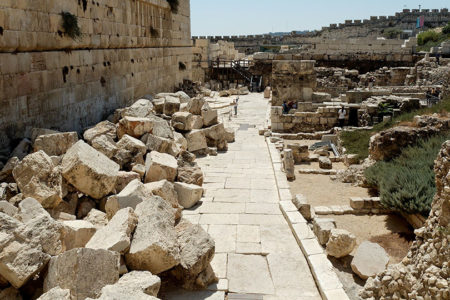On the Way to Canaan Land
George W. Bush had just won the presidential election for a second term. The confetti was still lying on the floor of GOP headquarters when Britain’s prime minister Tony Blair jumped forward to urge the United States to prioritize a peace settlement between Israel and the Palestinian Authority (PA). We have every reason to believe that President Bush shares the view of Mr. Blair, his staunchest ally in the global war on terrorism.
But as Israel attempts, once again, the Herculean task of creating peace in a geopolitical morass defined by violence—and as America and its allies encourage that process—it would be wise to revisit the true origins of the nation of Israel. Remembering the first principles of Israel’s national and geographical existence gives us an anchor amid the changing seas of international politics. It also forces us to decide whether God’s Word shall be taken seriously or whether the Bible is to be reduced to a mere passing cultural phenomenon—an interesting, somewhat quaint historical oddity, like the hoola hoop.
And if we return to Israel’s origins according to God’s history rather than man’s revisions of it, we must invariably deal with the Israelites’ Exodus out of Egyptian bondage.
The Significance of the Exodus
To some folks, the idea of an ancient Jewish exodus couldn’t be further from the contemporary issue of peace in the Middle East. I beg to differ. The Exodus could not be more central to the debate. As international parties cry for Israel to carve itself into Israeli/Palestinian pieces, we dare not forget the core question: From whence does Israel’s legitimacy spring? The September/October (2004) issue of Tikkun magazine, which addressed the future of democracy in Israel, couldn’t help but inferentially deal with that question as well.
In response to a letter to the magazine, the editors opined that “Jewishness” is a religious—not a racial—issue; and due to the past persecutions against Judaism, a nation for Jews is a must. Thus, they submitted, “The United Nations agreed to set up a state specifically for that oppressed people.”
No one disputes the history of the 1948 UN vote. But owing the existence of a Jewish state to the UN is a little like arguing that Americans’ unalienable rights first sprang to life with the Continental Congress and Thomas Jefferson and his drafting committee. That argument begs the question because it ignores the fact that American colonialists already believed their rights were “endowed” upon them “by their creator”; the rest was history.
So, too, although the UN vote was the instrument used to found the modern nation of Israel, it hardly accounts for the reason Israel exists or the legitimacy of its claim of title against all other pretenders.
In the same issue of Tikkun, Professor Jerome Slater wrote, “come what may, Israel will remain a Jewish state,” basically because the Jewish people need protection against violent, global anti-Semitism. but by that same logic, as soon as anti-Semitism wanes, Israel’s claim to national identity diminishes as well.
In the same magazine, Gilad Atzmon, a musician and author, claimed the leftist Zionists have wrongly “transformed the bible from a spiritual text into a legal document [a land registry].” but in His Word, God has issued a covenant to Jewish Israelites and their successors, granting them the “promised land” after their sojourn out of Egypt (Ex. 13:11; 15:17; 23:30–31). While that covenant is clearly much more than a mere legal document, it is also most certainly not something less than that.
The fact is, Israel’s origin as a nation and a people is traceable to the Exodus. History and all those scientific disciplines that help clarify it, including archaeology, epigraphy, and ancient linguistics, become part of the great debate. It was no accident that in 1993, after the peace accords, the pA quickly established its own archaeological agency. The Palestinians knew that power comes with winning the historical argument.
The Exodus Controversy
A growing number of liberal scholars and archaeologists (the so-called minimalists) reject the historicity of the Old Testament and the miraculous Exodus in particular. Dr. Israel Finkelstein of Tel Aviv University owes such accounts about Israel’s supernatural origins, not to divine revelation, but to the “human imagination” of Jewish leaders and priests during the Babylonian exile, some 1,500 years after the Exodus itself.
Others, like Eric Cline of George Washington University, are historical agnostics. Speaking of the Exodus in an interview on the National Geographic News Web site, Dr. Cline, a scholar in ancient middle East history, stated bluntly, “We can’t prove that it took place.”
The Archaeological Evidence
Yet there is, in fact, an abundance of potential evidence for the Exodus as described in Scripture. The problem arises when the expert source is not widely accepted in the scholarly disciplines or the evidence itself is simply too ambiguous for us to say definitely that it comes from the Exodus period or event. Therefore, to avoid relying on disputable proofs, I’ve listed the evidence derived from the “accepted” scholarly sources that corroborates the biblical account of the Exodus.
- Most experts (even the “minimalists” who invariably discount the historical accuracy of biblical accounts) agree on at least one thing: Evidence exists of “Semitic” peoples living within ancient Egypt at a time that corresponds to the pre-Exodus period.
- Recent diggings in Egypt reveal the presence of ancient four-room houses typical of Israelite use and quite atypical from any Egyptian design. Manfred Bietak, a noted archaeologist of Egypt, has concluded that the structures (1) could well correspond to that period near the biblical Exodus account and (2) would reveal the established presence of Israelites in ancient Egypt.
- Ancient hieroglyphics in Egypt depict the construction of huge structures by the use of slave labor. This would certainly be consistent with Exodus 1:13–14.
- A reference to a people group named “Israel” is found on an ancient Egyptian inscription. The famous Merneptah Stele, a stone column dated around 1208 B.C., refers to the people of “Israel” then living in Canaan. Under at least one scholarly theory of dates, this coordinates closely to the time after the Exodus from Egypt, when the Israelites began to conquer Canaan.
- There is archaeological evidence in the hill country west of the Jordan (the conquered “Canaan” territories of the Old Testament) of a sudden establishment of Israelite villages and increasing population unexplainable by the birthrate alone—all of which undergirds the notion of a conquest of that area after the Exodus, as described in Joshua.
- Perhaps most intriguing of all is the fact that pharaoh Akhenaten (Amenhotep IV) was the first (and only) ancient ruling Egyptian monotheist, unlike all of his predecessors and all his successors. His departure from the prevalent polytheism of the day by asserting there was only one great, transcendent God was a radical theological notion to ancient Egyptians. Why this break with religious tradition? One possible explanation relies on timing: He is considered to have ruled from 1353–1335 B.C. Many Bible scholars believe the Exodus occurred either during the 18th Egyptian dynasty (around 1425 B.C. and following) or as late as the 19th dynasty (anywhere from 1319 B.C. to 1222 B.C.). Akhenaten lands right in the middle of these periods. It is highly possible that he witnessed the events or was privy to accounts of them shortly after they occurred. We can easily see how accounts of Egypt’s apocalyptic plagues, the parting of the Red Sea, the rescue of the monotheistic Jews, and the destruction of the polytheistic Egyptian army would have caused Akhenaten to reorient his theology!
Claiming the Spiritual Geography
But the story of the Exodus is not only pertinent to the geopolitics of Israel and the Palestinian Authority but also astoundingly relevant to the church of Jesus Christ. Jesus verified that Moses was the human vehicle through which God transmitted the Law during the Exodus (Mt. 19:8; Mk. 7:10). Therefore, if we question the accuracy of Moses as the historical source of the Exodus story, we also doubt the veracity of Jesus Christ.
In his final sermon, Stephen, the first recorded Christian martyr, expounded at length on the factual reality of the Exodus (Acts 7:17–45). The apostle Paul authenticated Moses as the Exodus Law communicator (Rom. 10:5). If we question the Bible’s account of the Exodus, we dismantle the credibility of the entire New Testament record.
But the issue goes even beyond Christian apologetics. If we fail to grasp the factual reality of God’s miraculous saving of His people from bondage, the testing of their faith, and the sureness of His promise of a land for them, then we miss the whole background, the entire prototype, of God’s plan of redemption for us.
Just as the ancient Israelites were slaves of a cruel Egyptian pharaoh, so also, in a spiritual sense, we are all—in our natural and unsaved state—slaves to sin (Rom. 6:15). The power of sin, inherent in the flesh, still wars against us even after we are redeemed by God, threatening to bring us back into “captivity” (Rom. 7:23). Yet, just as God rescued the Israelites from Egypt by His mighty hand, so, too, has He reached down into human history to rescue us from condemnation, through His Spirit (Rom. 8:1).
How has God accomplished this great rescue? by the death of Jesus christ, the perfect Lamb (Rom. 8:32–34), symbolized prefiguratively by the pre-Exodus Passover (Ex. 12:5–7).
When God commanded His children to celebrate the passover with “your sandals on your feet, and your staff in your hand” and to “eat it in haste” (Ex. 12:11), He was being exceedingly practical. Shortly after the last (and most awful) of the plagues, Pharaoh finally relented and let the Israelites go. But a faith lesson was also involved in God’s instruction, both then and now.
The Israelites were commanded to truly believe that God would deliver them and to put their faith into action by having their sandals on their feet and their walking sticks at the ready. For Israel as a nation, it is time to count on the entitlement to canaan land and its borders by remembering the Exodus from which it all began.
And for all of us, it is time to understand—and to put into faithful action—the greatness of the redemption by which God, through His Son Jesus Christ, rescues us from the stinging whips of condemnation and bitter chains of captivity. It’s time to claim that land.







